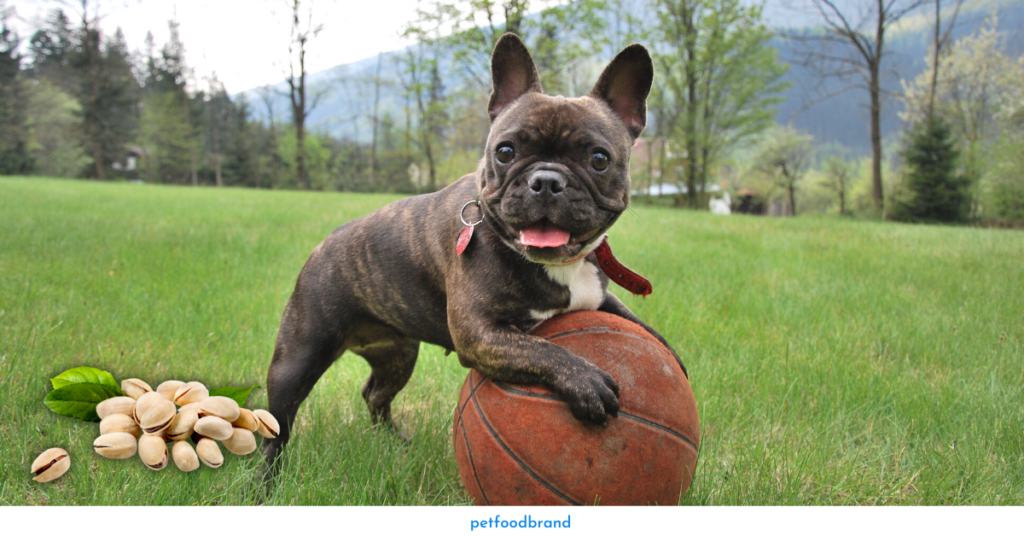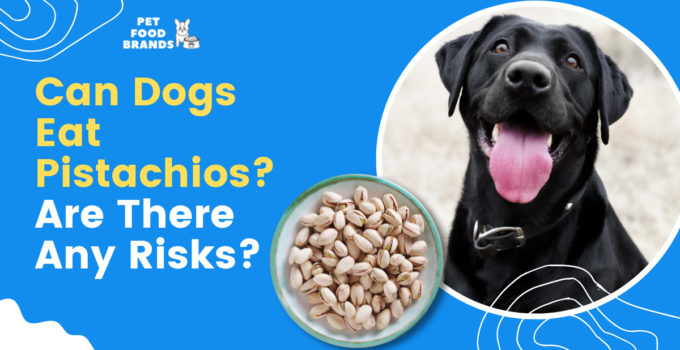Yes, dogs can eat raw, unsalted, and unseasoned pistachios in moderation. They are cholesterol-free and a great source of fats, vitamins, and minerals like manganese, phosphorus, copper, and vitamin B6.
50 kernels of pistachio contain about 160 calories, 13g fats, 8g carbs, and 6g protein.
Health benefits
- One of the benefits of pistachios for dogs is that they are a great source of vitamin B6. This nutrient is considered essential and has many positive effects on your pet’s general health and well-being. Vitamin B6 improves their cognitive processes, development, heart health, and overall growth.
- Pistachios are a great natural source of potassium. It is a mineral that is important for many functions in your pet’s body, including the proper functioning of cells and normal muscle contraction.
- One of the benefits of pistachios is that they are a great source of dietary fiber, which is essential for digestion. Eating enough dietary fiber can help your dog feel full for longer and soothe cases of mild constipation or diarrhea.
- Antioxidants can combat chronic inflammation, which is a factor in several common health problems in animals. Including them in your diet may be beneficial for any chronic inflammatory condition.
- Unsaturated fats in pistachio keep your dog’s coat healthy and shiny, along with other important roles in reproduction.
Risks
- Eating too many pistachios can cause pancreatitis in dogs due to their high fat content. Symptoms include abdominal pain, loss of appetite, upset stomach, vomiting, diarrhea, dehydration, and lethargy.
- Flavored pistachios are delicious, but they may lead to some negative side effects in dogs, such as vomiting and increased urination because of the presence of high sodium content.
- The intake of too much phosphorus from pistachios can lead to the formation of bladder stones.
- If your dog has a hard time breathing or swallowing, it may be experiencing a blockage in its esophagus caused by pistachio shells. An X-ray can assess if there is any damage to the esophagus.
- Pistachio shells also cause a GI distress risk for our canine friends. They can easily get lodged in the digestive tract.
- Some vets consider pistachios a hazard because they are frequently contaminated with aflatoxins. If your dog gobbles up a lot of pistachios, it may experience aflatoxin poisoning. Some symptoms of this are loss of appetite, vomiting, and jaundice.
How to feed pistachios to a dog?

- Some foods especially nuts may not be safe for your pup, so it’s a good idea to consult your vet first.
- Giving your dog nuts can be a good way to give them the nutrients they need, but make sure they’re plain and unsalted.
- A lot of us love eating pistachio nuts, but take care when you offer them to your pup. Their shells are a choking hazard, and they might also be unsafe for the doggy gut. Be sure to either peel the shells off or opt for no-shell pistachios instead.
- Do not feed more than 5 pistachios a day. Do not make pistachios a part of regular dog treat. Just serve it to your dog occasionally.
Can dogs eat pistachio ice cream?
No, Dogs should not eat pistachio ice cream. Pistachios aren’t toxic to dogs, but ice cream may contain dairy. A large number of dogs are allergic to dairy or lactose and eating it may trigger gastrointestinal symptoms, such as diarrhea and vomiting.
Can dogs eat almonds and pistachios?
No, dogs should avoid almonds. However, they can eat pistachio in moderation. Almonds are not as toxic as some other nuts, but dogs might have trouble digesting them. Watch out for these symptoms like vomiting, diarrhea, loss of appetite, and lethargy if a dog eats too many almonds at a time.

Ankita is a passionate pet lover and head of content at Pet Food Brands. With her extensive knowledge and research, she provides pet owners with top-quality information on dog food and nutrition. Her dedication to improving the lives of dogs makes her a leading voice in the industry.




